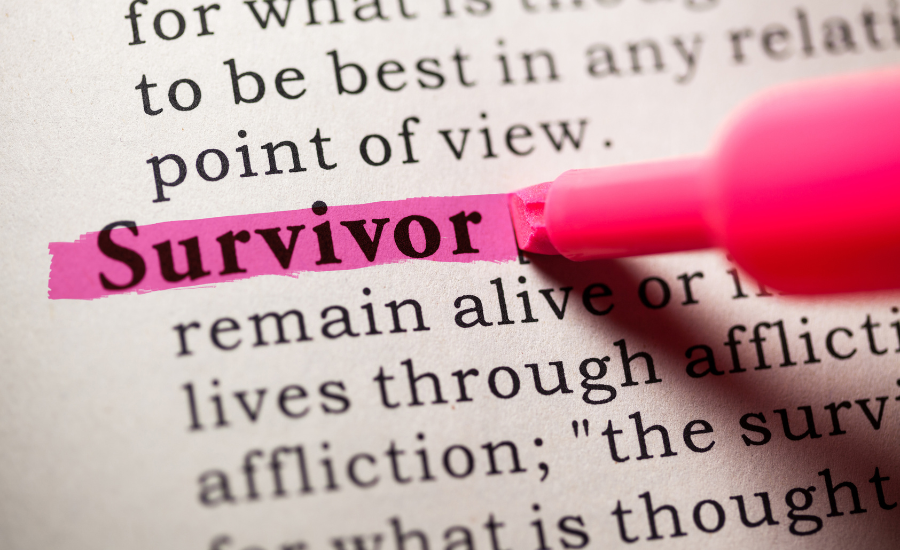September is National Suicide Prevention Awareness Month. Did you know that suicide is the 11th leading cause of death in America? And 90% of those who die by suicide have a diagnosable mental health condition at the time of their death. Suicide is one of those behaviors that is preventable; but when you hear that, you can internalize that message and blame yourself for not preventing it.
You Are a Survivor
Friend, if you are a survivor of suicide loss, I’m so sorry! They don’t call you a survivor for nothing! I’ve talked with survivors who hate this term because they say they don’t have a choice; but just like you, they do! However, it takes every ounce, every speck, every atom within you to will yourself to keep living. It takes incredible energy to simply get out of bed or to eat something. And God knows how much effort it takes to focus on anything! The physical aspects of emotional pain make every part of your body feel like a lead weight that you are dragging around.
The Three C’s
Let’s talk about the three C’s – you didn’t cause it, you couldn’t control it, and you couldn’t cure it. I know how strong the tendency can be to blame yourself. Maybe you didn’t answer their call or you had to change a lunch date or maybe you were out of town for some reason. But friend, do any of these things cause death? You may feel like they did in your case, but the truth is they do not. However, mental illness does sometimes cause death. It was not a choice they made. It was a result of a mental health condition. Unfortunately, they did not have access to a healthy mind at that particular time.
Signs of Suicide
We hear stories about signs to look for in suicide. And there are some signs we can look for: like depression, hopelessness, overwhelming sadness, isolation, and a bleak outlook. But are you using this to blame yourself because you didn’t know the signs or because you didn’t see them? Friend, sometimes there are no signs. Sometimes, 5 minutes before death people are doing normal, everyday things. And sometimes, once a person gives in to their unhealthy mind that dying is what they will do, the person can seem to improve. Sometimes people seem to improve once they are on meds. However, just because they begin to improve does not mean that their brain is healed. This can be so confusing, and leave you grappling with guilt; but you are not a fortune teller. You cannot accurately predict someone’s every move. Research shows that many who die by suicide have impulsive tendencies. The truth is we will never know what was going through their mind at the time, and that is difficult to accept.
So, what can you do?
Four Things You Can Do Today
First, give yourself permission to grieve with no timeline or expectations. For suicide survivors, I have read that early grief, which is usually the first two years, can be closer to the first 5 years because suicide loss tends to adds extra layers of grief. It’s okay that you cry all of the time, especially in the first year, because it is evidence of the love you have.
Second, allow your grief to be expressed and witnessed. Just as Jesus modeled grief when He wept with the sisters of Lazarus (John 11), you too can invite safe people to journey with you. There are times when you will want to be alone, and you need to be, but don’t allow isolation to become your new normal. Be willing to express your grief to others and allow them to witness your tears. God put your tear ducts in your eyes for this reason – so that others can see when you are hurting and need comfort. Be willing to receive it!
Third, seek grief counseling from a qualified professional who has experience with suicide loss. This is also a way to model healthy grieving to others which in itself can be a postvention prevention! Death by suicide brings many complex factors and the help of a skilled therapist can help you to process your grief in a healthy way. They can help you to express emotions that you may not realize you have or perhaps those you are afraid to expose. The Bible states that you walk through the valley of the shadow of death (Psalm 23), and that God is with you when you do. But as Dr. Edith Eger likes to add, don’t camp out there or get used to it. Keep going until you get to a different place!
Fourth, do not give in to fear and discouragement! It’s so easy to do when your whole world has been shaken to its core. It’s normal to have to rethink your assumptions about God, the world, others, and yourself. But don’t allow your experience to define you or God! Let God define Himself and give you your identity! Regardless of what has happened in your life, the words of God are true, and He has not forsaken you! I Chronicles 28:20 [NIV] states, “Be strong and courageous, and do the work. Don’t be afraid or discouraged, for the Lord God, my God, is with you. He will not fail you or forsake you…” So, friend, when you are tempted to despair or fear, fall into the arms of Jesus today, tomorrow, and always!
Friend, if you’d like to hear the interview with my friend, Rita Schulte, about her journey through suicide loss, please be sure to go to the free Facebook group, Grief Support Delighted by Grace. You will hear Rita discuss her loss, her struggle in the aftermath of suicide, and the hope she found to move forward with her grief.



Leave A Comment